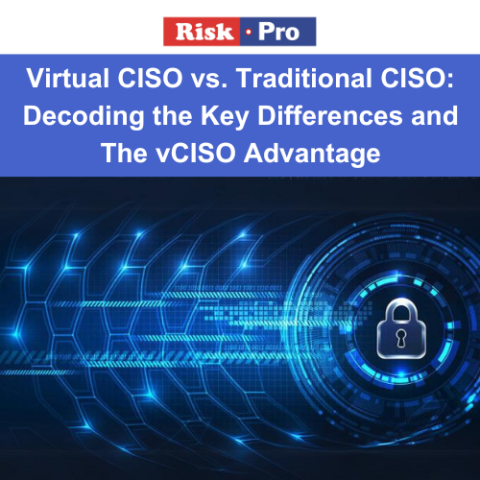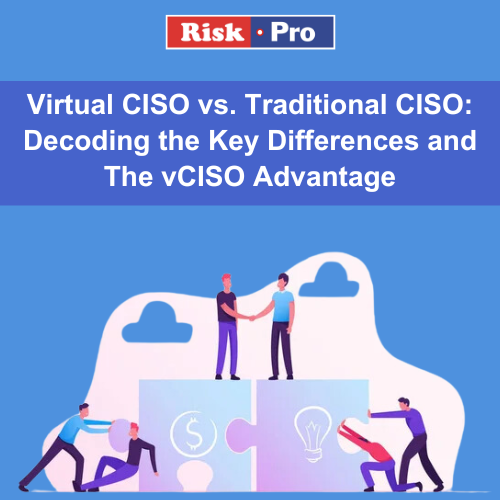
In the dynamic realm of digital security, vCISOs and traditional CISOs play crucial roles in guiding organizations through cybersecurity challenges. While both bolster cyber resilience, they diverge in operational models and strategic impacts. This analysis reveals key differences, emphasizing the transformative benefits of virtual cybersecurity leadership.
Virtual CISO vs. Traditional CISO: A Comparative Analysis
Cybersecurity Leadership: Traditional CISOs offer steady, in-house leadership, deeply integrated within the organization's culture and daily operations. In contrast, vCISOs provide remote security services, bringing a broader perspective of cybersecurity leadership that transcends conventional organizational boundaries.
Outsourcing Cybersecurity vs. In-house Expertise: Outsourced CISO services offer flexibility and access to a wider pool of expertise without the overhead costs associated with full-time positions. Traditional in-house CISOs, while offering deep organizational knowledge, often come with higher costs and resource allocation challenges.
Strategic Cyber Defense: vCISOs, with their experience across various sectors, can introduce innovative, adaptive security strategies that might not be immediately apparent from within an organization. Traditional CISOs may excel in understanding specific organizational risks but could be limited by a narrower scope of industry-wide best practices.
Cost-Effective Cybersecurity: The vCISO model is inherently designed to provide cost-effective cybersecurity solutions. Organizations can tap into high-level expertise on a flexible basis, optimizing cybersecurity resource allocation without the significant financial commitment of a full-time executive.
Flexible Security Solutions vs. Static Approaches: The agility of vCISO services allows for the rapid adjustment of security strategies to meet emerging threats, a flexibility less inherent in the traditional, full-time CISO framework.
Organizational Cyber Resilience: Both vCISOs and traditional CISOs aim to enhance organizational cyber resilience, but vCISOs leverage remote CISO services and virtual security services to extend resilience measures beyond physical office spaces, crucial in today’s increasingly remote and digital workplace environments.
Security Governance and Decision-Making: Traditional CISOs may have an advantage in direct, day-to-day security governance and quicker decision-making due to their physical presence. However, vCISOs compensate with streamlined remote cybersecurity management protocols and swift, informed cybersecurity decision-making based on a wealth of cross-industry experiences.
Industry Compliance: vCISOs often manage multiple clients and thus must stay abreast of a wide range of compliance requirements, which can provide an edge in ensuring an organization meets diverse industry standards. In-house CISOs' deep dive into specific regulatory landscapes can offer more customized compliance strategies but may lack the breadth of the vCISO's insights.
Cybersecurity Expertise and Innovation: The outsourced model of vCISOs enables organizations to access a collective pool of cybersecurity expertise and innovation, often at the cutting edge of cyber defense technologies and methodologies. Traditional CISOs, while highly knowledgeable, may face limitations in quickly adopting new cybersecurity innovations due to budgetary, operational, or bureaucratic constraints.

Leveraging vCISOs: A Blueprint for Success
The advent of vCISOs has marked a significant shift in how organizations approach cybersecurity transformation. They provide proactive, adaptable leadership, moving beyond mere responses to digital security challenges. The benefits of the vCISO model include:
Cybersecurity Transformation: vCISOs drive cybersecurity transformation by implementing strategic cyber defenses and flexible cybersecurity solutions that are both innovative and adaptive to changing threats.
Digital Security Leadership: Virtual leadership impacts cybersecurity by ensuring that strategic decision-making is both agile and informed, leveraging global insights for localized application.
Cost-Effective Cybersecurity: The model presents a financially viable option for organizations of all sizes, democratizing access to top-tier cybersecurity expertise.
Proactive Cyber Defense and Cyber Resilience: With a focus on proactive measures, vCISOs enhance cyber resilience, preparing organizations to not just respond to but anticipate and mitigate cybersecurity threats.
Virtual Security Services: The remote nature of vCISO services ensures that organizations can maintain robust cybersecurity measures regardless of geographical constraints, making it an ideal solution in the era of remote work and global operations.
Looking Forward: The vCISO in the Future of Cybersecurity
As the digital era progresses, the vCISO is becoming increasingly essential in many organizations’ cybersecurity frameworks, offering vital strategic expertise that significantly enhances cyber resilience in a cost-effective and operationally viable manner. In an environment where robust cybersecurity is imperative for survival and success, the vCISO emerges as a key player, delivering flexible, strategic guidance to navigate complex digital risks and ensure organizational security in the rapidly evolving digital economy. To know more contact us at info@riskpro.in
